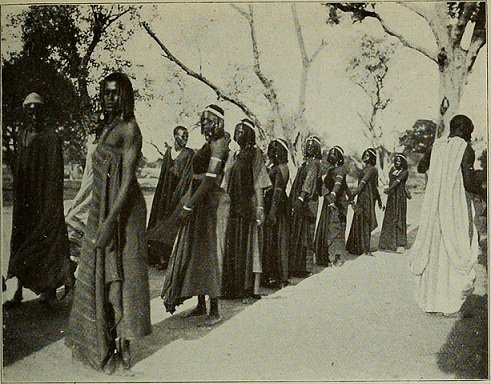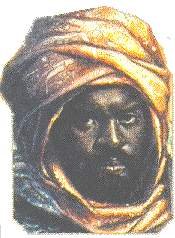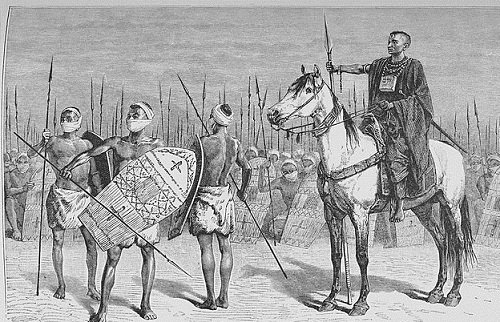ADSactly History : History Of Northern Nigeria (Part 2) - Kanem-Bornu In The Pre-colonial Era
We are still in the survey of the history of the Northern part of Nigeria. In the first part, we took a look at the Hausa/Fulani ethnic group and their influence in Nigeria. We also talked about their origin and socio-political organization before the colonial era. In this episode, we will look at the Kanem-Bornu ethnic group.

Kanem-Bornu Ethnic Group
Some people that live outside the Northern part of Nigeria may not know the difference between the Kanem-Bornu and the Hausa/Fulani tribe - this is because of the similarity in both cultures and other traditional practices. If you can recall from our last post, we mentioned in passing that Bayajida (the recognized founder of the ancient Hausa tribe) journeyed through Kanem-Bornu and got married to one of the daughters of the King (Mai) of the land of Bornu. This can explain the similarity in both cultures; obviously, they are seen as ancestral in-laws.
However, in contrast to the Hausa people that have Hausa language as their primary dialect, the primary dialect of the Kanem-Bornu tribe is Kanuri and their people are referred to as "Kanuris". During the ancient time (particularly during the reign of Mai Idris Alooma - one of the most prominent kings of the ancient Kanem-Bornu empire), Kanem-Bornu empire was very influential, strategic, large and even pre-dated the Hausa ethnic group. During the pre-colonial time, Kanem-Bornu cut across Chad, Niger, Cameroon and not just Nigeria. In this present time, however, they are predominantly found in the Northern part of Nigeria.
Origin of Kanem-Bornu
Kanem-Bornu has a very rich historic account and their origin has been passed on by "oral tradition" from the pre-colonial time to this present era. Just like the Hausa tribe, the Kanem-Bornu ethnic group has many versions of their origin (including myths and legends) but we will focus on the ones that have been generally accepted by Kanuri history scholars.
The Version of Saif (Sayf) Dhiyazan
This is a migratory account of the origin of the Kanem-Bornu ethnic group. According to renowned history scholars and oral tradition, Kanem-Bornu was founded around the 9th century AD along the coast of lake Chad by Saif Dhiyazan (an Arabian Warrior and hero). The first dynasty that was established in Kanem-Bornu was the Saifawa dynasty. Nigerian historians will agree with me that you can't discuss Kanem-Bornu without pointing to Saifawa dynasty. This dynasty was seen as the longest and most influential dynasties in the entire sub-saharan Africa during the pre-colonial era.
It was from the Saifawa dynasty that other sub-regions of Kanem-Bornu were created and they migrated along the Chadian lake till they found their way to the Northern part Nigeria. The capital of Kanem-Bornu was latter shifted to Ngazargamu (located in Bornu state of Nigeria) and was consolidated by Mai Idris Alooma.

The Version of SO
It has been a popular belief that the SO tribe were the original occupants and founders of the Kanem-Bornu ethnic group. This version has a little similarity with the version of Saif Dhiyazan but as against the Saifawa dynasty being the first to be founded, the SO was recognized as the first.
The SO tribe were said to be invaded by immigrants from the Chadian region, and even with their cultural sophistication, they were overpowered and SO was taken over by these immigrants and that was how the later Kanem-Bornu empire was founded. Many history scholars have refused this version though, but some Kanuris still believe they descended from SO.
The religion practised by the present day Kanuris is the islamic religion. This was as a result of the conquering of Kanem-Bornu by Fulani jihadists. Around the 16th century, a particular war known as the Fulani war; which was regarded as holy war (Jihad) took place in Kanem-Bornu (led by Usman Dan Fodio) and Fulani warriors conquered Kanem-Bornu and introduced islamic orthodoxy.
Kanem-Bornu Administration and Socio-political Organization
During the pre-colonial time, the administration of Kanem-Bornu ethnic group centered on kinship. The Mai (who is translated as king) occupied the highest rank in authority. They also ran a primogeniture monarchical system where the eldest son of the Mai was the heir apparent to the throne upon the demise of the Mai. Much more than that, the mother of the Mai, known as Magira (queen mother) also occupied a strategic authority in Kanem-Bornu and well respected by the Kanuris.
In the ancient times; and even presently; the Mai selects his cabinet and among them is the Maini Kanendi (which is the title given to the chief justice of the state and the legal adviser and attorney of the Mai). The Mai also controls the Kanuri army which is made up of brutal and elite soldiers who are willing to put their lives on the line to protect the Mai.

However, the Mai (during the pre-colonial era) did not have absolute power because he was answerable to the titled nobilities. These were groups of administrators (which can be seen as house of assembly in this present era) that oversaw the activities of the Mai and his cabinet. The titled nobilities included the Galadimas, the Yerimas, Meshemas, and even Kaigam (king makers). The political structure of Kanem-Bornu has been structured in this format even till this present time, the only difference is the heavy influence of the Hausa/Fulani in parts of Kanem-Bornu that brought islamic orthodoxy.
Authored by @samminator
Click the coin below to join our Discord Server
)
Your informative posts on Nigeria show us unknown parts (for me, and I suppose also for others) of this important African territory, for which I thank you, @samminator. It allows us to see the recurrence of certain historical patterns in the development of humanity, such as invasions, which impose foreign religions and hegemonic forms of government, such as dynasties. Thank you and greetings.
Thanks a lot buddy. Africa has a very rich cultural heritage which, I believe, everyone should know about. This is part of the reasons I've decided to research and write about them.
Thanks for reading buddy
I didn't know much of the information that you put here, but I see many similarities between this race and others, which are not precisely from Africa. I am struck by the idea of structuring their government cabinets with relatives. A practice that is still in force in many countries and although it may give more security to the government in office, it also lends itself to corruption. Reviewing the history of Africa makes me see where the root of many of the internal problems and conflicts that affect some parts of Africa lie. I once watched a documentary about the marriages of the Kanem-Bornu ethnic group and was amazed at how young people get married and the responsibility that any family owner takes on. As always, interesting, @samminator
Yeah you're right. Some ethnic groups in Nigeria have similar cultural heritage and some of them shared a common ancestry.
Actually, Kanem-Bornu is not the only ethnic group that practices primogeniture system of government. No doubt, this system of government has its own disadvantages as it does not support a democratic setting.
Thanks for reading, Nancy
I am now seeing the history of Nigeria from a different angle. As you rightly said, there are similarities between the culture of Hausa and kanuris, now I know why they have similar culture.
I hope to see more of the history of Nigeria.
Good job @samminator
Sure buddy, that's the idea; to bring the history of Nigeria (and black continent of Africa) to limelight for all to see.
Thanks for reading
Seriously @samminator, you just ignited something inside of me. I am a lover of history. The Saifawa dynasty known to be in the western Chad but migrated to Borno north-eastern part of Nigeria in 1380. Before they became muslim,they were known as Duguwa dynasty.It was believed that they are the ancestors of the present day Borno people.Those people are highly sophisticated politically. They cant be underestimated. Thanks for sharing this piece on steemit.
Wow! It's good to know that there are other history lovers here.
Yeah, present day Bornu people (even people from Yobe state) are believed to be descendants from Saifawa dynasty.
Thanks for reading buddy
The pleasure is mine. My Dad made me to love history, he is an historian.
Wow! That's cool. My mum is a historian. This also explains my love for history. I have access to some of her research materials
Woah!!! This is an intense research. I had thought that both the Hausa/Fulani people and the Kanuris are the same. It's so cool, that I now know they are different tribes.
It was an interesting, informative and entertaining read. Keep up the great work. Can't wait for next part, if there will be.
Sure there will be a next part buddy. I'm glad you found the post educative.
Thanks for reading
This is a very expository piece on the history of Nigeria. Who would have thought that Kanuris and Hausa ethnic group are different? Now I know the difference. Thanks for sharing this @samminator
It's an honour to write about the history of Nigeria (and Africa). I'm glad you found the post valuable.
Thanks for coming around buddy
Hello @samminator
In my world music studies, I have discovered the tribal songs and dances.
I will investigate these two ethnic groups, thanks for your input and congratulations on your mention in @adsactly
Yes, these ethnic groups have very unique tribal songs that anyone from Nigeria can easily differentiate them.
Thanks for coming around buddy
Nice piece. This is indeed a good explanation of the northern part of nigeria. Most persons do think that northern nigeria is made up of hausa and fulani's neglecting the other minority tribes.
It is cool to know the history and tradition of a place. Nice post
Exactly, some people (even Nigerians) lay less emphasis on other tribes in the Northern part of Nigeria apart from Hausa-Fulani. There are some tribes in Northern Nigeria that played strategic roles in the ancient times, and I think people should know about them.
Thanks for reading
Have you guys ever considered visuals? I think video content appeals to people more and you guys have that option to explore on steem to create a larger audience on and off the steem blockchain. Having a channel where topics like this can be discussed broadly with a different perspective might be good for your tribe/community.
Posted using Partiko Android
Visuals would be a very good idea where evidences of historical pieces and archaeological remains can be discussed. It's a step at a time though; with time, everything will fall into place
Wow! So many ethnic groups exist in the northern Nigeria. I was thinking it's just Hausa. I guess all of them practise Islamic religion.
Nice work @samminator
Yeah, the predominant religion in the Northern part of Nigeria is Islam. And yes, there are many ethnic groups in the North. Hausa is just the largest; that is why it looks like it is the only ethnic group there. We’ll take another one in the next part.
Thanks for reading
I’ll be sure to check it out. Meanwhile, I saw this publication about Jihad and I think you should check it out since you mentioned about Jihad.
That’s great. I’ll check out the publication.
Stay cool